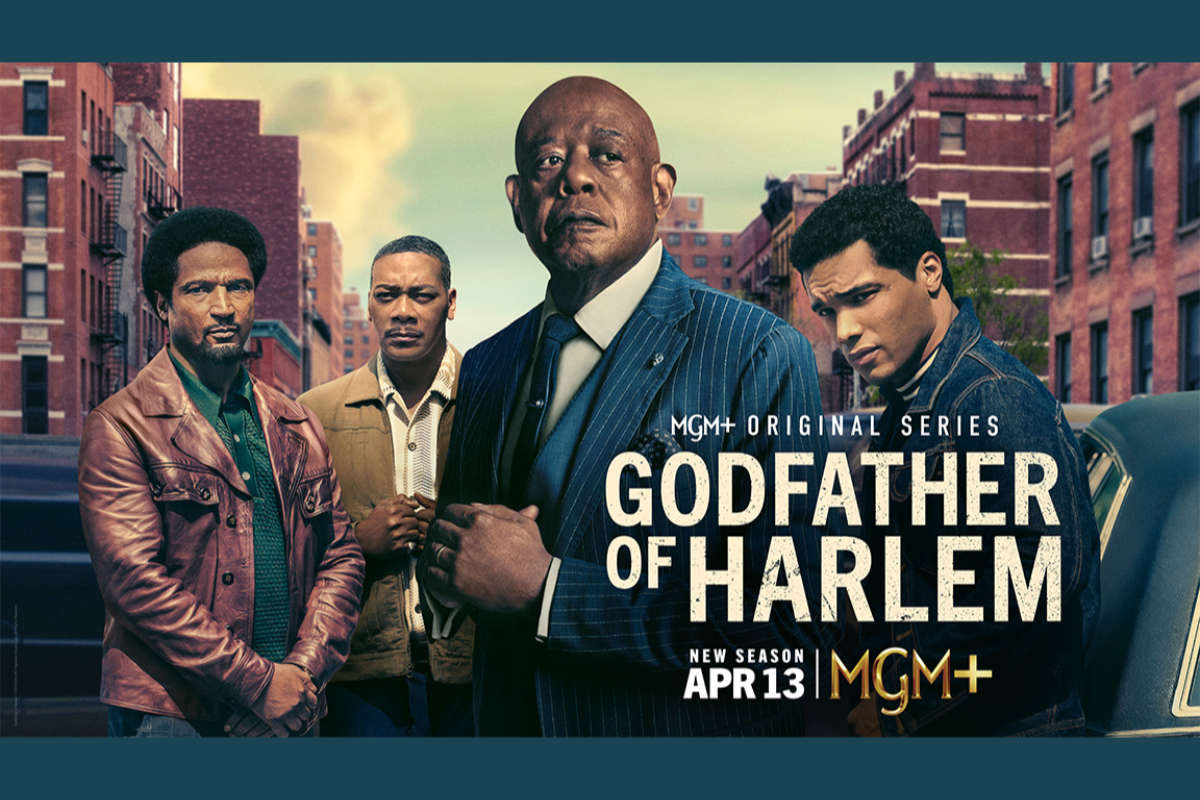
As the Executive Producer of Godfather of Harlem, Markuann Smith is more than just the man behind the curtain—he’s the engine pushing the period crime drama forward, season after season. Now heading into its fourth installment, Smith sat down to unpack the intricacies of Season 4, the legacy of Bumpy Johnson, and his own wild ride through hip hop history and Hollywood.
SEASON 4: A SHIFT IN POWER, PURPOSE, AND PROMISE

“Season 4 is a rollercoaster ride, you know?” Smith said. “If you saw the beginning of Season 1, it was so much of a conflict between the collision of civil rights and the underworld.”
Now, that clash intensifies. With the death of Malcolm X at the end of Season 3, Bumpy Johnson is caught between honoring a fallen brother and surviving Harlem’s relentless game of power.
“Bumpy made a promise to Malcolm that he would get out the dope game,” Smith explained. “And as you see in the opening of [Season 3] Episode 4, he’s really trying to transition and kind of live up to Malcolm’s expectations of him… but money’s a factor. He won’t be able to get a loan, and he has to figure out what can he do to keep the Italians off of him and just become his own man.”
ENTER: FRANK LUCAS AND THE BLACK PANTHERS

Season 4 also introduces a new player in Harlem’s high-stakes chessboard—Frank Lucas.
“Absolutely! We’re going to see the introduction of Frank Lucas and The Black Panthers to merge with The Black Pride Movement,” Smith said, signaling a powerful cultural shift in the show’s direction.
But for those expecting a carbon copy of Denzel Washington’s portrayal in American Gangster, Smith offers a word of caution.
“Well, we took a lot of creative liberty in bringing the Frank Lucas character into Godfather of Harlem, you know? We have a big disclaimer every time the episodes airs that everything is not non-fiction. It’s fiction. It’s not a documentary.”
Instead, viewers will see Frank as a rising force from La Grange, North Carolina—an ambitious dreamer with his eyes on Harlem’s throne.
“You see another man coming up from the South to the big city trying to get the American Dream by any means necessary,” Smith noted. “And Bumpy sees that in him. Now if they’re friends? You’ll never know. You’ll have to watch all the episodes… but there’s gonna be a lot of tension.”
The tension, Smith explained, is rooted in their real-life dynamic.
“Frank and Bumpy in real life… they weren’t very favorable towards each other. Frank was loud, Frank was boisterous, while Bumpy was more quiet. But when you see him being entered into the Season 4 episode, you see Frank coming to Harlem and then there’s a power struggle within.”
DELAYED BUT NOT DENIED: COVID, STRIKES & SETBACKS

So why did it take so long for Godfather of Harlem to return?
“We got caught up in this funny matrix,” Smith admitted. “During COVID-19… it was hard for any production straight across the board… and there was a strike. So you had COVID, you had the Writer’s Strike, and you had the Screen Actors Guild Strike.”
All those elements combined to halt production, but Smith and his team stayed committed to ensuring cast and crew safety while continuing to elevate the story.
FOREST WHITAKER’S BUMPY JOHNSON: A MASTERCLASS IN METHOD

Forest Whitaker’s portrayal of Bumpy Johnson has been the soul of Godfather of Harlem. And as Smith revealed, the actor’s transformation was years in the making.
“Well, the show came from my inception 18 years ago because it’s based on my godmother,” he shared. “My godmother used to live in Lennox Terrace 490, and Bumpy Johnson’s character was well known in the street but not well known in history.”
Smith dove deep, collecting microfilm clippings from Jet and Ebony magazines, tracking down self-published poetry, and conducting hours of interviews with Harlem OGs who knew Bumpy firsthand.
“I brought that into the writer’s room… and introduced Forest to them as well. And Forest took that… he seasoned it up, you know?”
The end result?
“He became this phenomenal character.”
HISTORICAL INTEGRITY AND PROFESSOR JAMES SMALLS

To make sure the series remained historically grounded, Smith brought in a key figure: Professor James Smalls.
“He’s an African-American historian. He was born and he grew up in the 60’s, and the 70’s, and the 80’s and the 90’s. He actually was Malcolm X’s sister’s [Ella L. Collins] bodyguard when Malcolm X got assassinated,” Smith said.
Professor Smalls’ presence helped ensure authenticity in the storytelling—bridging the gap between dramatization and cultural truth.
SEASON 5? STAY TUNED…

From where Smith sits, the road ahead looks promising.
“From your mouth to the film god’s ears… we have enough material to go to Season 6 because Bumpy dies in 1968 and right now we’re in 1966.”
And the numbers speak volumes.
“We are the flagship of MGM+… anywhere from 5 million to 6 million viewers every Sunday. The show is amazing… I would think there would be a Season 5.”
SWIZZ BEATZ: THE SOUND BEHIND THE STORY

Swizz Beatz isn’t just the executive music producer. He’s a storyteller in his own right.
“When you say outside of music, lemme tell you that music is a key part because he’s painting the picture,” Smith explained. “If I have A$AP Ferg in Studio A and you have Rick Ross in Studio B… he’s painting these pictures; he’s painting his own stories through the music.”
Swizz even delivered the theme song that earned an Emmy.
“Swizz is an amazing person — big shout out to him Grady as well as Weezy and Moah over there in Jungle Studios. It really gives us that street vibe of like we’re in the concrete in the back of the days of Harlem.”
ON GIANCARLO ESPOSITO: “UNCLE JON”

Giancarlo Esposito, who plays Adam Clayton Powell, holds a special place in Smith’s heart.
“I love ‘Uncle Jon’, man! That’s my guy!” Smith said with a smile. “He’s humorous, humble, and has a big heart… and just being able to play in the sandbox with him as a fellow thespian is just… Amazing.”
Even off set, the legendary actor drops gems on Smith.
“He teaches me the little tricks of the trade… and he’s one of the hardest working people in the business right now.”
THE JUICE ERA: PAC, JANET, AND A COMING-OF-AGE IN HOLLYWOOD

Long before Godfather of Harlem, Smith was part of the iconic 90s film Juice.
“I got my first acting role in Juice; big shout out to the late great Tupac Shakur,” Smith remembered. “He brought me on set and I was one of the truant kids that Samuel L. Jackson was chasing through the arcade room.”
It was more than a role—it was a connection.
“’Pac was a roadie for Digital Underground and Treach was a roadie for Queen Latifah. We would sit down and talk about life… how these two brown boys just wanted to make it in this business.”
Their friendship stretched into Poetic Justice, where Smith also worked alongside Janet Jackson and Regina King.
“‘Pac and Janet had a real cool relationship… He used to tell me how much he thought Janet was pretty… and just seeing all these amazing actors growing up and coming up together… it’s just AMAZING to me.”
FROM HARLEM TO HOLLYWOOD: A FULL CIRCLE

The same man who ran backstage as a roadie on New Jack Swing tours with Father M.C., Chubb Rock, and EPMD is now executive producing one of the most culturally rich series on television.
“Krush Groove was really about the music,” Smith reflected. “Juice was about the coming-of-age story of a kid trying to find himself and he ended up going down the wrong path… and it relates today, man… Everybody is not your friend.”
From Lennox Terrace to MGM+, Markuann Smith’s journey is a Harlem tale all its own. And with Godfather of Harlem still rolling strong, his best chapters may still be ahead.

